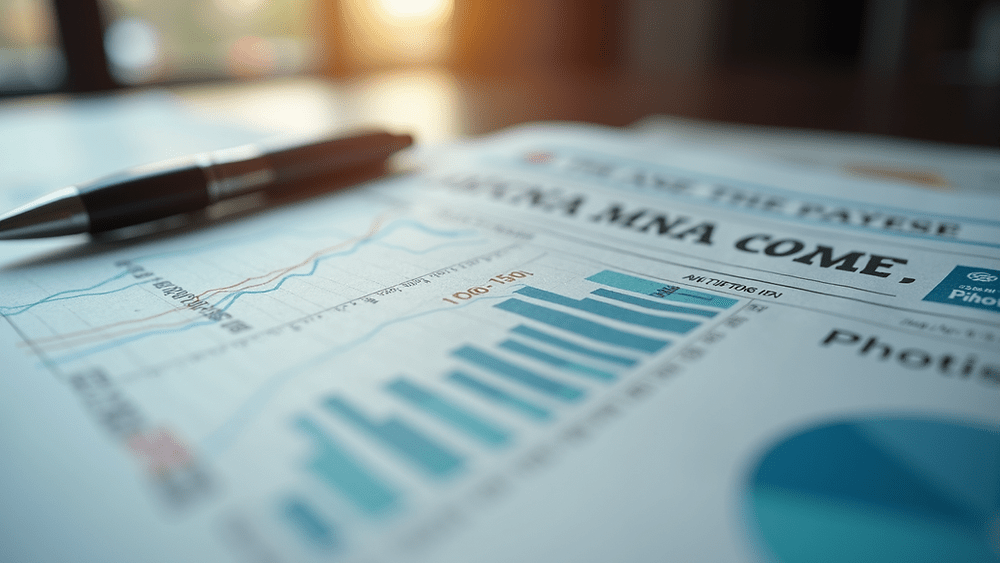
When I first started trading forex, I quickly realised that economic news updates can make or break a trade. The market reacts fast, and if you’re not prepared, you could miss out on big opportunities or face unexpected losses. Understanding how upcoming economic news affects forex is crucial for anyone serious about trading profitably. Let’s dive into how these updates influence the market and how you can use them to your advantage.
Why Economic News Updates Matter in Forex Trading
Economic news updates are like the heartbeat of the forex market. They provide insights into a country’s economic health, influencing currency values. When a major report drops, traders react instantly, causing price swings that can be both exciting and risky.
For example, if the UK releases a stronger-than-expected GDP report, the British pound often strengthens. Conversely, disappointing employment data might weaken it. These movements happen because traders adjust their expectations about interest rates, inflation, and economic growth.
Here’s why you should pay attention:
-
Volatility spikes: News releases often cause sharp price movements.
-
Market sentiment shifts: Positive or negative data can change trader confidence.
-
Trading opportunities: Volatility creates chances for profit if you act wisely.
By tracking economic news updates, you can anticipate market moves and plan your trades accordingly.

How to Prepare for Economic News Updates
Preparation is key! I always check the economic calendar before the trading day begins. This calendar lists all the important reports scheduled for release, such as inflation rates, employment figures, and central bank announcements.
Here’s a simple checklist to get ready:
-
Identify key reports: Focus on high-impact news like interest rate decisions, CPI, and unemployment data.
-
Understand expectations: Know the forecasted numbers and how they compare to previous data.
-
Plan your strategy: Decide if you want to trade before, during, or after the news release.
-
Set risk management rules: Use stop-loss orders to protect your capital from sudden moves.
For instance, if the US Federal Reserve is about to announce a rate decision, I avoid opening large positions just before the release. Instead, I wait to see the market reaction and then enter trades with clear stop-loss levels.
Remember, not all news affects every currency pair equally. Focus on the currencies related to the country releasing the data.
Understanding Market Reactions to Economic News
Markets can react in surprising ways! Sometimes, even good news leads to a currency drop, and bad news causes a rally. This happens because traders look beyond the headline numbers to the underlying implications.
Let me explain with an example:
-
Better-than-expected inflation: This might suggest the central bank will raise interest rates sooner, boosting the currency.
-
Too high inflation: Could also mean the economy is overheating, increasing risk of a slowdown, which might weaken the currency.
It’s essential to read the context and market sentiment. Watching how the price moves immediately after the news can give clues about the market’s interpretation.
Here are some common patterns I’ve noticed:
-
Initial spike followed by retracement: Traders react quickly, then take profits or reassess.
-
Sustained trend: If the news confirms a long-term economic trend, the currency may continue moving in one direction.
-
Volatility without clear direction: Conflicting data or mixed signals can cause choppy price action.

How to Trade Around Economic News Safely
Trading during news releases can be thrilling but risky. I recommend a cautious approach, especially if you’re still building your confidence.
Here are some practical tips:
-
Use smaller position sizes: Volatility can cause slippage and widen spreads.
-
Avoid trading right before the release: The market can be unpredictable.
-
Set stop-loss and take-profit levels: Protect your trades from sudden reversals.
-
Consider trading the news fade: Sometimes, the initial move reverses as traders take profits.
-
Stay informed: Follow reliable sources for real-time updates.
For example, if you decide to trade the US Non-Farm Payrolls report, wait for the initial volatility to settle before entering a position. This reduces the risk of being caught in a false breakout.
Also, keep an eye on the broader market context. If the overall trend supports the news move, your trade has a higher chance of success.
Using Upcoming Economic News to Your Advantage
I always keep an eye on upcoming economic news to stay ahead. Knowing what’s coming allows me to plan trades and manage risk effectively.
Here’s how you can leverage this information:
-
Create a trading plan around news events: Decide which reports to trade and how.
-
Backtest strategies: See how your approach would have performed during past news releases.
-
Stay flexible: Be ready to adapt if the market reacts differently than expected.
-
Join a community: Sharing insights with other traders can improve your understanding.
By integrating economic news updates into your trading routine, you’ll gain confidence and improve your decision-making.
Building Confidence with Economic News Trading
At first, trading around economic news can feel overwhelming. But with practice, you’ll learn to read the signals and act decisively.
-
Start small: Use demo accounts or small trades to test your strategies.
-
Keep a trading journal: Record your trades and the news context to learn from mistakes.
-
Educate yourself: Use resources like Forex Fire to deepen your knowledge.
-
Stay patient: Not every news event will create a perfect trade setup.
Remember, trading is a journey. Each economic news update is a chance to learn and grow.
By mastering how upcoming economic news updates impact forex, you’ll be better equipped to navigate the markets confidently. Stay informed, plan your trades, and manage your risk. The financial markets reward those who prepare and adapt. Let’s keep learning and trading smart!




